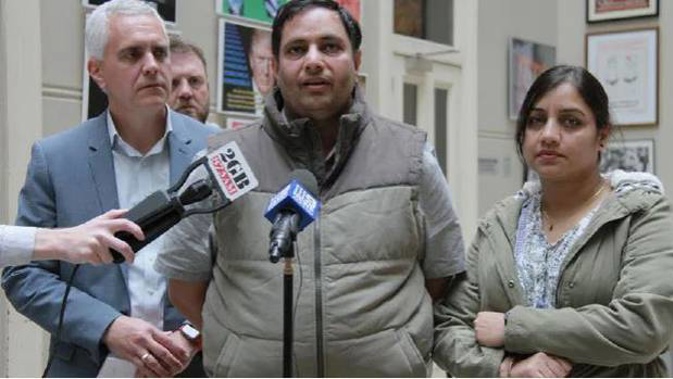
Adelaide driver Amita Gupta logged on to work for UberEats for 96 hours in one week, but only earned A$300 ($324). When she was 10 minutes late with a delivery, she was sacked.
Gupta took her case to the Fair Work Commission alleging underpayment and unfair sacking but in July it rejected her application, finding she was "not an employee" under Australian law and therefore "not a person protected from unfair dismissal".
The Transport Workers Union, which last month sued food delivery platform Deliveroo for wage theft on behalf of a Canberra rider Jeremy Rhind, is now taking up Gupta's case, lodging a notice of appeal with the Commission.
TWU national secretary Michael Kaine with Adelaide couple Santosh and Amita Gupta, who say they were underpaid and unfairly sacked by Uber. Photo / Supplied
"We worked around 2700 hours and we got paid a total of A$21,000," her husband Santosh told a news conference at the TWU headquarters on Monday. "It works out to only A$7.85 an hour, (after) vehicle expenses it works out to A$5 an hour. It's slavery in the modern world in Australia."
Gupta said companies like Uber "tweak their contracts to make it look like workers are independent contractors (so) their rights can be exploited".
"We are very fortunate living in Australia where people have good rights and good conditions to live (but) people are still treating workers as slaves," he said.
Gupta said the "pathetic" Uber Eats app would sometimes direct a rider to take a particular route, which the company would then not pay.
"They only pay the shortest route," he said.
TWU national secretary Michael Kaine said in a statement the case "highlights just how low Uber can go in terms of abusing workers".
"They expect workers to be logged on for hours with no work and if they are a few minutes late they get sacked, with no warning or right to appeal," Kaine said.
"These drivers have chosen to take a stand, demand their rights and take on Uber. We believe the Fair Work Commission's decision to refuse their case for unfair sacking was wrong and we believe there are strong grounds to appeal it."
The notice lodged by the TWU last week lays out four grounds for appeal, which largely focus on the power imbalance between Gupta and Uber Eats and the degree of "effective control" in the relationship.
Uber has already batted away a handful of unfair dismissal cases, but the TWU's intervention against the global ride-sharing giant marks a new stage in the legal wrangling over protections for gig economy workers.
The union last year won a landmark unfair dismissal case against Foodora on behalf of former rider Josh Kluger. Foodora has since exited the Australian market.
"We again appeal to the federal government to intervene in this case to ensure all workers in Australia have rights," Kaine said.
"We also appeal to the government to regulate the gig economy. It cannot be left any longer to individuals to take on these cashed-up Silicon Valley behemoths, dragging them through the courts."
Kaine said gig economy workers "must be given rights to guaranteed minimum rates, sick leave, adequate workers' compensation when they are injured on the job, the right to collectively bargain and the right to challenge an unfair sacking".
"California last week stepped up and gave these rights to workers, why can't the Australian government do the same?" he said.
California's state legislature last week passed a bill requiring gig economy companies like Uber and Lyft to classify workers as employees rather than independent contractors.
The bill, which awaits signing by California governor Gavin Newsom, has been fiercely opposed by the tech giants and could ultimately force them to cease operating in their home state.
Uber has been contacted for comment.
Take your Radio, Podcasts and Music with you









